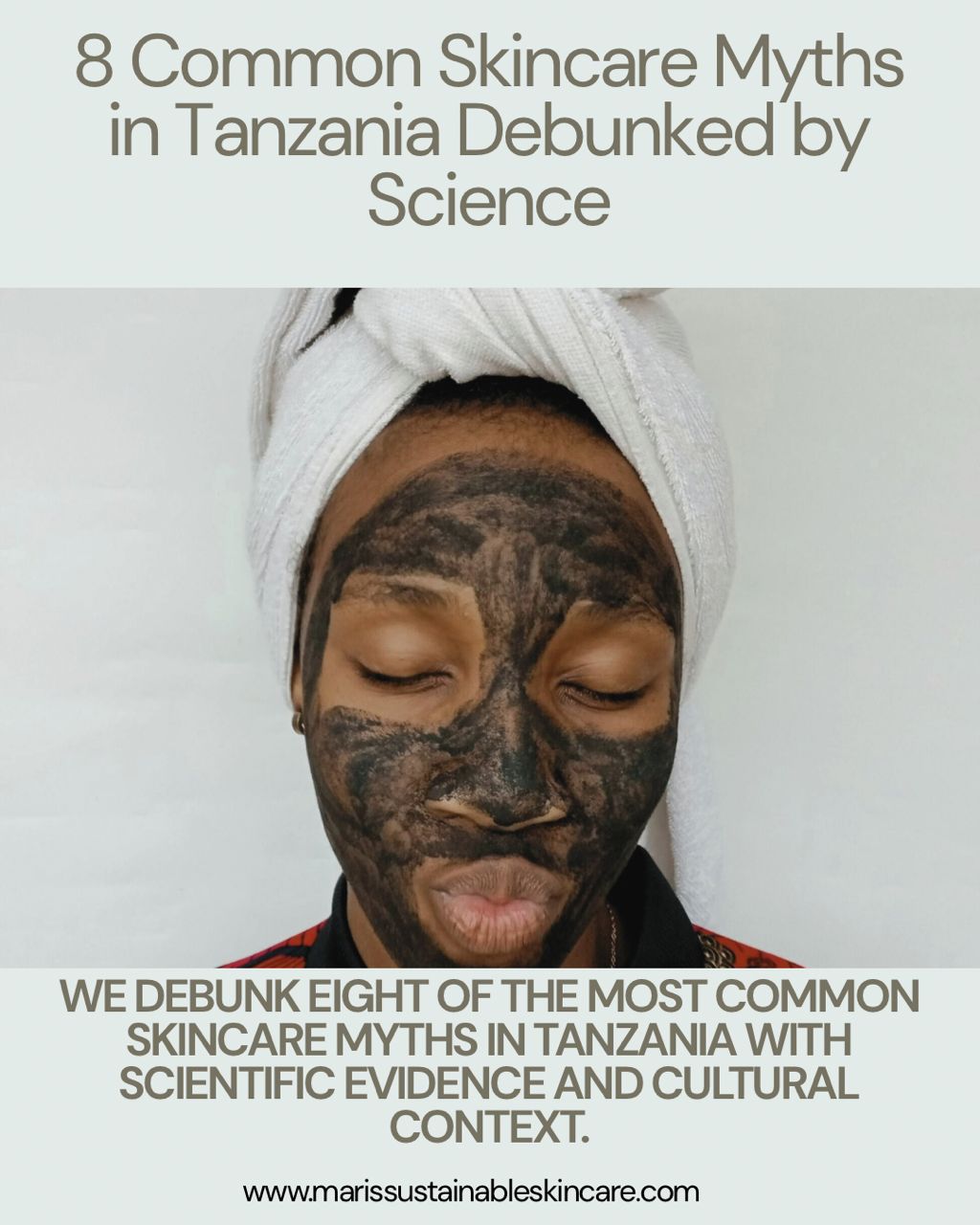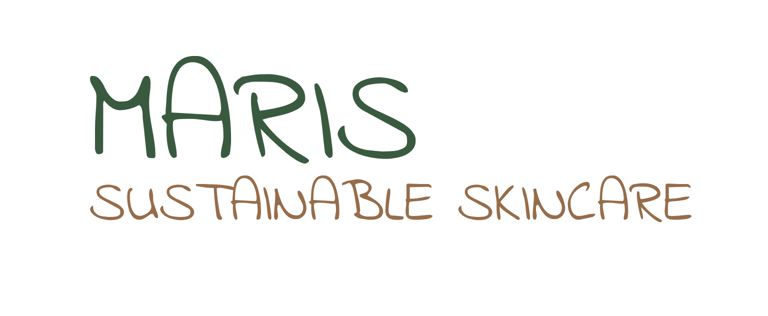Why Myths Shape Skincare in Tanzania
8 Common Skincare Myths in Tanzania Debunked by Science
Mariam Ismail Rumatila
9/27/20255 min read


8 Common Skincare Myths in Tanzania Debunked by Science
Introduction:
Why Myths Shape Skincare in Tanzania
In Tanzania, skincare is more than just a routine it is influenced by climate, heritage, and community traditions. For generations, people have relied on natural remedies like neem, aloe vera, baobab, and coconut oil to maintain healthy skin. While many of these practices are beneficial, a number of misconceptions also persist, shaped by social media, peer advice, cultural beliefs, and the global beauty industry.
These myths matter because they can lead to ineffective routines, wasted money, or even skin damage. As Maris Sustainable Skincare, our mission is to share science-based knowledge rooted in respect for Tanzanian heritage. By combining dermatology research with cultural understanding, we empower people to make informed, safe, and sustainable skincare choices.
Below, we debunk eight of the most common skincare myths in Tanzania with scientific evidence and cultural context.
Myth 1: Darker Skin Doesn’t Need Sunscreen
What people say:
Since most Tanzanians have medium-to-deep skin tones, it is widely believed that melanin offers full protection from the sun, making sunscreen unnecessary.
Why it’s a myth:
Melanin does reduce sunburn risk, but it does not block all the harmful effects of ultraviolet (UV) rays. UVA radiation penetrates deep into the skin, causing premature aging, hyperpigmentation, and DNA damage regardless of skin tone.
What the science says:
● Research shows darker skin is still vulnerable to photoaging and pigmentation disorders.
● Dermatologists stress that sunscreen prevents not just burns but also uneven tone and long-term collagen breakdown.
● Skin cancer rates are lower in darker skin but not zero; when they occur, they are often detected late.
it persists in Tanzania:
● Sunburn is less visible in darker skin, making the damage “invisible.”
● Sunscreen is expensive and sometimes unavailable.
● Cultural norms and marketing rarely emphasize sun protection for African skin.
Myth 2: More Expensive Products Are Always Better
What people say:
Foreign luxury creams and serums must be superior to local or affordable options.
Why it’s a myth:
Price reflects branding, packaging, or import costs not always efficacy. The true measure is the concentration and stability of active ingredients.
What the science says:
● Clinical studies confirm that ingredients like retinoids, niacinamide, and vitamin C are effective regardless of whether they are in luxury or budget formulations.
● Affordable products with the right actives can outperform premium creams with poor formulations.
Why it persists in Tanzania:
● Imported brands carry prestige and trust.
● Weak cosmetic regulation means cheaper products may sometimes be unsafe, fueling the belief that “costlier is safer.”
● Historical bias toward foreign goods over locally produced ones.
Myth 3: Natural Ingredients Are Always Safe
What people say:
If it is natural, it cannot harm you.
it’s a myth:
“Natural” does not equal safe. Plants contain powerful chemicals some helpful, some irritating, some even toxic.
What the science says:
● Essential oils like lemon, clove, or cinnamon can cause allergic reactions or phototoxicity.
● Natural extracts vary in potency depending on climate and harvest conditions.
● Synthetic versions of natural molecules are often safer because they are standardized and tested.
Why it persists in Tanzania:
● Strong tradition of herbal medicine and trust in ancestral remedies.
● Limited awareness of patch testing and clinical validation.
● Marketing of “organic” or “herbal” products feeds the perception that natural equals harmless.
Myth 4: Acne Comes from Dirt or Poor Hygiene
What people say:
If you have pimples, it means your face is dirty or you don’t bathe enough.
Why it’s a myth:
Acne is primarily a medical condition involving hormones, oil production, clogged pores, and bacterial activity not simply dirt.
What the science says:
● Over-washing strips the skin barrier, causing more irritation and sometimes worsening acne.
● Treatments that regulate sebum, reduce inflammation, and target Cutibacterium acnes are most effective.
● Stress and diet can influence acne, but hygiene alone is not the cause.
it persists in Tanzania:
● Hot, humid climate increases sweat and oil, leading people to equate acne with uncleanliness.
● Cultural stigma: acne is sometimes seen as a result of neglect.
● Social advice focuses on scrubbing and soaps rather than dermatology.
Myth 5: Skin Lightening Products Are Safe if Used Carefully
What people say:
It’s fine to use whitening creams in moderation to even skin tone.
Why it’s a myth:
Many unregulated skin-lightening creams contain harmful ingredients like mercury, high-dose steroids, or unlisted hydroquinone. Even short-term use can damage skin and health.
What the science says:
● Mercury causes systemic toxicity, kidney damage, and irreversible pigmentation.
● Steroid misuse thins the skin, weakens immunity, and leads to permanent sensitivity.
● Safe brightening agents (like niacinamide or vitamin C) exist but harmful products dominate the unregulated market.
Why it persists in Tanzania:
● Colorism and global beauty standards equating lighter skin with beauty and success.
● Lack of strict enforcement against illegal imports.
● Promise of “quick results” is tempting in a society that values instant transformation.
Myth 6: Drinking More Water Alone Gives Perfect Skin
What people say:
For glowing skin, just drink 8–10 glasses of water a day.
Why it’s a myth:
Hydration is important, but skin health depends on more than water intake. External care, nutrition, hormones, and genetics also play key roles.
What the science says:
● Mild dehydration can make skin appear dull, but beyond normal hydration, excess water has little direct effect on skin glow.
● Clinical improvements in skin hydration come more from topical moisturizers and barrier protection than drinking extra water.
● Balanced diet with antioxidants, vitamins, and essential fatty acids is more critical than water alone.
Why it persists in Tanzania:
● Simplicity of the advice makes it appealing.
● Hot climate emphasizes the need to drink water, often linked to appearance.
● Social media influencers spread this “easy fix.”
Myth 7: Pores Can Open and Close
What people say:
Using steam or cold water opens and closes your pores.
Why it’s a myth:
Pores are not doors. They do not have muscles to open or close. They can only appear larger or smaller depending on oil, debris, and skin elasticity.
What the science says:
● Heat and steam loosen debris and oil, making pores look more prominent, but they do not “open.”
● Cold water or ice reduces swelling temporarily, making pores appear smaller but structure remains the same.
● Genetics, collagen levels, and skin health determine pore size.
Why it persists in Tanzania:
● Widespread advice in salons and home remedies.
● Visible changes after steaming or icing make the myth feel “true.”
● Lack of dermatology education in mainstream skincare culture.
Myth 8: The Harsher the Scrub, the Cleaner the Skin
What people say:
Rough scrubbing removes dirt and dead skin better, leaving skin brighter and healthier. Why it’s a myth:
Over-exfoliation damages the skin barrier, causing micro-tears, irritation, and increased sensitivity.
What the science says:
● Skin naturally renews itself every 28 days on average.
● Gentle exfoliation helps but harsh scrubs strip natural oils and can worsen acne, dryness, or hyperpigmentation.
● Chemical exfoliants (like AHAs and BHAs) at safe concentrations are more effective than aggressive physical scrubs.
Why it persists in Tanzania:
● Cultural preference for “feeling clean” after scrubbing.
● Popularity of homemade scrubs (sugar, salt, lemon) with immediate but sometimes damaging results.
● Lack of awareness of skin barrier science.
Why Skincare Myths Matter
Misinformation is not harmless. Believing myths can:
● Lead to unnecessary or harmful practices (e.g., skin bleaching, over-scrubbing).
● Waste money on ineffective products.
● Delay treatment of medical conditions like acne or eczema.
● Damage confidence and mental health when results do not match expectations.
Maris Perspective: Science, Heritage, and Sustainability
At Maris Sustainable Skincare, we believe that knowledge is the foundation of healthy beauty. Tanzania has a rich heritage of using natural botanicals, but myths and misinformation can undermine both safety and effectiveness. Our values center on:
● Science first: relying on dermatological research and validated ingredients.
● Respect for heritage: drawing inspiration from African botanicals, while testing them rigorously for safety and efficacy.
● Sustainability: sourcing ethically and protecting ecosystems for future generations.
● Transparency: being honest about what products can and cannot do.
While our current role is educational, Maris aims to pioneer products that unite tradition and science, providing safe and effective solutions tailored to East African skin.
Conclusion: Knowledge is Skincare Power
Skincare in Tanzania is deeply influenced by culture, climate, and tradition but myths often stand in the way of healthy, effective practices. By debunking common misconceptions from sunscreen and skin bleaching to scrubbing and “pore opening” we can empower individuals to care for their skin with confidence.
Education, not just products, is the most powerful tool for achieving healthy, radiant skin. At Maris, we are committed to building that foundation, step by step, myth by myth.
Join the Maris Community
© 2025 Maris Speak Up. All rights reserved.
Your privacy is important to me. Rest assured, your email will never be shared or sold.
Info@marissustainableskincare.com
Our official email
Join our community of early supporters and get exclusive benefits when we launch our skincare brand. As a founding insider, you’ll be the first to hear about product updates, enjoy early access, and receive special rewards made just for our day-one members. Plus, you'll get skincare tips and behind-the-scenes content as we build something meaningful together.
